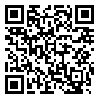Volume 24, Issue 2 (March - April 2025)
Payesh 2025, 24(2): 273-275 |
Back to browse issues page
Download citation:
BibTeX | RIS | EndNote | Medlars | ProCite | Reference Manager | RefWorks
Send citation to:



BibTeX | RIS | EndNote | Medlars | ProCite | Reference Manager | RefWorks
Send citation to:
Aligol M. A critique on the perceived self-efficacy construct in study of “The effect of a health belief-based educational intervention on the COVID -19 preventive behaviors among young people”. Payesh 2025; 24 (2) :273-275
URL: http://payeshjournal.ir/article-1-2325-en.html
URL: http://payeshjournal.ir/article-1-2325-en.html
Department of Health Education and Health Promotion, Faculty of Health, Qom University of Medical Sciences, Qom, Iran
Abstract: (1496 Views)
Dear Editor,
In an article entitled "The effect of a health belief-based educational intervention on the COVID -19 preventive behaviors among young people", the "perceived self-efficacy" construct, has been intervened. It is useful to explain that, increasing in score of self-efficacy construct requires setting achievable goals in the short term and providing the opportunity to practice to achieve them. But not enough explanations have been given on how to increase self-efficacy in the study. Also, paying attention to the topic of “observational learning” as an effective factor in this situation and conducting an intervention related to this factor could play an effective and evidence-based role in increasing self-efficacy. In addition, adequate explanations about possible confounding variables and how to control them would have helpe to increase the validity of the results. Describing the limitations of the study and potential sources of bias in relation to the self-efficacy construct could provide readers with a better understanding of the scope and validity of the study. As a result, although this study shows a strong relationship between self-efficacy and preventive behaviors of Covid-19, it needs more precision in key areas, including the practical definition of the term, content validity and possible biases in measuring self-efficacy.
In an article entitled "The effect of a health belief-based educational intervention on the COVID -19 preventive behaviors among young people", the "perceived self-efficacy" construct, has been intervened. It is useful to explain that, increasing in score of self-efficacy construct requires setting achievable goals in the short term and providing the opportunity to practice to achieve them. But not enough explanations have been given on how to increase self-efficacy in the study. Also, paying attention to the topic of “observational learning” as an effective factor in this situation and conducting an intervention related to this factor could play an effective and evidence-based role in increasing self-efficacy. In addition, adequate explanations about possible confounding variables and how to control them would have helpe to increase the validity of the results. Describing the limitations of the study and potential sources of bias in relation to the self-efficacy construct could provide readers with a better understanding of the scope and validity of the study. As a result, although this study shows a strong relationship between self-efficacy and preventive behaviors of Covid-19, it needs more precision in key areas, including the practical definition of the term, content validity and possible biases in measuring self-efficacy.
Subject:
Letter to editor
Received: 2023/11/1 | Accepted: 2025/11/5 | ePublished ahead of print: 2025/05/5 | Published: 2025/05/5
Received: 2023/11/1 | Accepted: 2025/11/5 | ePublished ahead of print: 2025/05/5 | Published: 2025/05/5
References
1. Masoudi R, Gholamian Dehkordi B, Asgari N, Fazel Z, Rabiei L. The effect of a health belief-based educational intervention on the COVID-19 preventive behaviors among young people. Payesh 2023; 2 :313-322 [Persian] [DOI:10.61186/payesh.22.3.313]
2. Butler TJ. Principles of health education and health promotion. 3th Edition, Morton Publishing Company: USA, 2001
3. Fryling MJ, Johnston C, Hayes LJ. Understanding observational learning: An interbehavioral approach. The Analysis of verbal behavior 2011; 27:191-203 [DOI:10.1007/BF03393102]
4. Aligol M, Nasirzadeh M, Akhondi M, Mazar L, Mosavifard S.M. Attitude and Related Factors towards COVID-19 Prevention based on the Health Belief Model among the Rafsanjan Citizens. Journal of Education and Community Health 2021; 8: 223-228 [Persian] [DOI:10.52547/jech.8.3.223]
Send email to the article author
| Rights and Permissions | |
 |
This work is licensed under a Creative Commons Attribution-NonCommercial 4.0 International License. |






